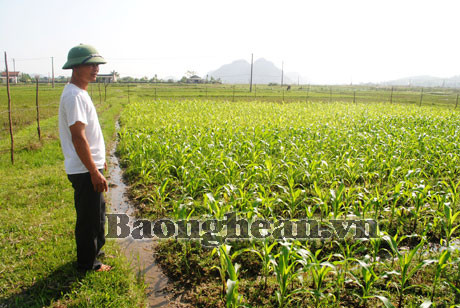Final article: Supporting vocational training and job creation for farmers
In industrial parks, some land areas have been recovered but projects have not been implemented on schedule, or investors have received land but have not started construction, causing people to lose land and have no jobs, and businesses have not been able to attract workers... This has greatly affected the economic development of the locality and caused negative consequences for social security.

People take advantage of production on the "suspended" planning land area.
To increase the efficiency of land use, it is necessary to carefully select and appraise land use projects in the direction of using less land area but bringing efficiency in terms of employment, income and budget revenue, avoiding the situation of granting investment licenses to the wrong subjects, investors without sufficient capacity; for investors who have received land but do not implement the project, it is necessary to recover it.
The Management Board of the Southeast Economic Zone has reviewed and identified 16 projects that are behind schedule and are about to be revoked, with an area of over 75 hectares. However, the difficulty in this revocation work is the settlement of invested assets of the projects, especially projects that lease land from industrial park infrastructure investors. There are projects where the revocation work lasts up to 5 years. In order for this work to be carried out better, Mr. Tran Duc Thanh - Deputy Head of Planning and Investment Department, Management Board of the Southeast Economic Zone, said: The Board has recommended to the Ministries and the Government to soon issue specific instructions on the handling of assets on invested land after revoking the project's investment certificate.
Because there is no legal regulation for enterprises to recruit local workers when implementing projects, there needs to be specific regulations binding on project owners using land so that they commit to using local labor. From there, vocational training for farmers should be organized close to the reality and needs of enterprises.
Currently, schools and vocational training centers often teach the jobs they have rather than the jobs that people or businesses need, leading to the fact that after finishing school, workers cannot develop their knowledge, while businesses still lack labor. To support businesses and improve the quality of human resources, it is necessary to create a harmonious and close relationship between vocational training centers and businesses, in order to meet the labor needs of businesses, while creating stable jobs for local people.
To gradually overcome the situation of abandoned industrial zones and unemployed farmers, first of all, it is necessary to promptly and effectively implement Decision 52/2012/QD-TTg of the Prime Minister; sectors and localities need to approach and effectively implement a number of methods that are close to practical conditions.
In recent years, Nghi Loc district has introduced occupations such as bamboo and rattan weaving, mushroom growing, flower and ornamental plant growing, animal husbandry, veterinary medicine, etc. to communes with large areas of reclaimed land, but due to low income and unstable output, the effectiveness has not been much. In this reality, the construction of a job creation model through the introduction of handicrafts to form and develop new craft villages needs to be paid more attention by localities. These are occupations that, although not high in income, are easy to learn and the production scale can be expanded, the products are easy to consume, creating jobs for many workers and increasing the local budget.
Along with training support from the local budget, households should be encouraged to use compensation money for their children to learn a trade, and then use this money to change to a suitable job to create economic efficiency. In addition, it is necessary to guide and create conditions for workers whose land has been recovered to work abroad for a limited period of time, and encourage exported workers to send money back to invest in production and business, creating jobs. The State should create conditions for them to start a business and change their career by creating conditions for people whose land has been recovered to borrow capital from banks at reasonable interest rates, to develop new production industries.
While investors have not yet used the land, people are still trying to produce rice and corn on unleveled areas. However, due to the heavy mentality of "working for others", economic efficiency is not high. To avoid land waste, agencies should calculate so that people have better production conditions such as land lending time, and have support mechanisms for production conditions to increase the value per unit of land area. For unfeasible projects, it is possible to recover and hand over the land to farmers so that they can confidently produce. Localities with recovered land need to be proactive and flexible in converting the structure of crops and livestock to increase people's income.
On November 16, 2012, the Prime Minister issued Decision 52/2012/QD-TTg on policies to support job creation and vocational training for workers whose agricultural land has been recovered. Accordingly, from January 1, 2013, workers in households directly engaged in agricultural production whose land has been recovered by the State will enjoy support policies within 3 years from the date of the land recovery decision. Specifically, if workers have a need for training or vocational training, they will be admitted to vocational training facilities and supported with vocational training costs. Workers whose agricultural land has been recovered and who need to find jobs will be supported with vocational training counseling, job counseling, and free job referrals. If you want to work abroad, you will be supported with 100% of tuition fees for vocational training, foreign languages, health check-up costs, passport, visa and criminal record... In addition, production and business establishments that accept many workers whose agricultural land has been recovered will enjoy preferential policies on land, credit, tax... |
Pham Bang - Quynh Lan






